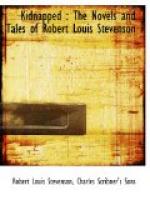“Will ye bring me his brush?” cries Alan, fiercely. “Ay, that’s the man. In he steps, and gets papers from King George, to be so-called King’s factor on the lands of Appin. And at first he sings small, and is hail-fellow-well-met with Sheamus—that’s James of the Glens, my chieftain’s agent. But by-and-by, that came to his ears that I have just told you; how the poor commons of Appin, the farmers and the crofters and the boumen, were wringing their very plaids to get a second rent, and send it over-seas for Ardshiel and his poor bairns. What was it ye called it, when I told ye?”
“I called it noble, Alan,” said I.
“And you little better than a common Whig!” cries Alan. “But when it came to Colin Roy, the black Campbell blood in him ran wild. He sat gnashing his teeth at the wine table. What! should a Stewart get a bite of bread, and him not be able to prevent it? Ah! Red Fox, if ever I hold you at a gun’s end, the Lord have pity upon ye!” (Alan stopped to swallow down his anger.) “Well, David, what does he do? He declares all the farms to let. And, thinks he, in his black heart, ’I’ll soon get other tenants that’ll overbid these Stewarts, and Maccolls, and Macrobs’ (for these are all names in my clan, David); ‘and then,’ thinks he, ‘Ardshiel will have to hold his bonnet on a French roadside.’”
“Well,” said I, “what followed?”
Alan laid down his pipe, which he had long since suffered to go out, and set his two hands upon his knees.
“Ay,” said he, “ye’ll never guess that! For these same Stewarts, and Maccolls, and Macrobs (that had two rents to pay, one to King George by stark force, and one to Ardshiel by natural kindness) offered him a better price than any Campbell in all broad Scotland; and far he sent seeking them—as far as to the sides of Clyde and the cross of Edinburgh—seeking, and fleeching, and begging them to come, where there was a Stewart to be starved and a red-headed hound of a Campbell to be pleasured!”
“Well, Alan,” said I, “that is a strange story, and a fine one, too. And Whig as I may be, I am glad the man was beaten.”
“Him beaten?” echoed Alan. “It’s little ye ken of Campbells, and less of the Red Fox. Him beaten? No: nor will be, till his blood’s on the hillside! But if the day comes, David man, that I can find time and leisure for a bit of hunting, there grows not enough heather in all Scotland to hide him from my vengeance!”
“Man Alan,” said I, “ye are neither very wise nor very Christian to blow off so many words of anger. They will do the man ye call the Fox no harm, and yourself no good. Tell me your tale plainly out. What did he next?”
“And that’s a good observe, David,” said Alan. “Troth and indeed, they will do him no harm; the more’s the pity! And barring that about Christianity (of which my opinion is quite otherwise, or I would be nae Christian), I am much of your mind.”
“Opinion here or opinion there,” said I, “it’s a kent thing that Christianity forbids revenge.”




